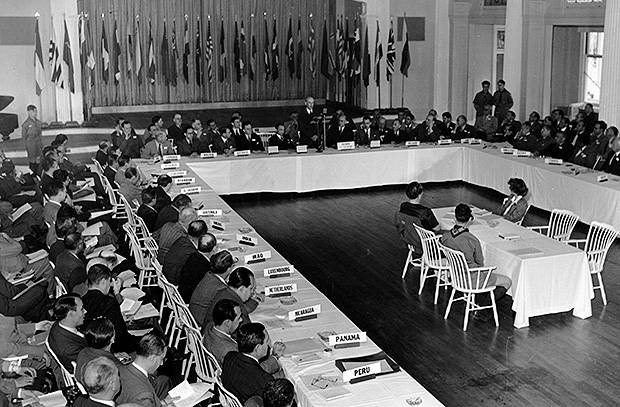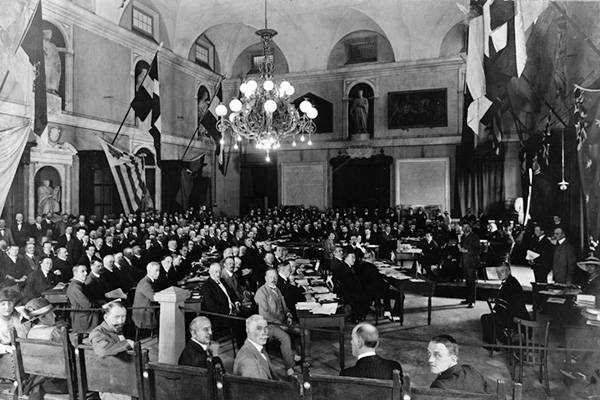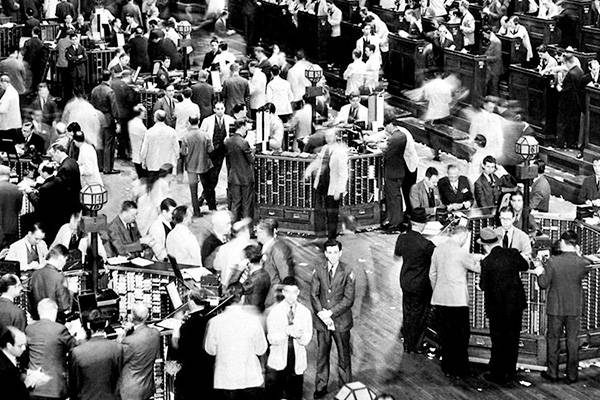The Bretton Woods System, or How the US Seized World Domination

Bretton Woods Conference 1944.
At the end of World War II, the dollar became the main currency of the planet thanks to the monopoly right to exchange for gold
72 a year ago, 1 July 1944, began a fundamental change in the global economy, fixed in the agreements a few days later. However, the understanding of what happened came to ordinary people much later.
The world of finance has always been something like a mixture of an equilibristic with the magic of circus magicians. Most of his basic concepts are difficult to understand, not only by ear, but also completely conditional in nature. At the same time, finance is inextricably linked with money, and money has always been an instrument of power. Not surprisingly, with their help for many centuries, someone constantly tried to take over the world.
For example, in July 1944, a group of gentlemen held a conference in the resort town of Bretton Woods (New Hampshire, USA) in the Washington Mountain hotel, which resulted in the eponymous global financial system that marked America’s final victory over its long-standing geopolitical world rival - the UK. The winner got the rest of the world - more precisely, almost the whole, since the Soviet Union refused to enter the new system. However, for the United States, it was only an interim step towards global financial hegemony, which America was able to achieve, but it was not destined to stay on the Olympus.
Milestones
The transition from subsistence farming to machine production, among other things, caused a large-scale growth in labor productivity, thereby forming significant commodity surpluses that local markets could no longer absorb. This prompted the countries to expand foreign trade. For example, over the 1800 – 1860 years, the average annual volume of Russian exports increased from 60 million to 230 million rubles, and imports - from 40 million to 210 million. But the Russian Empire in international trade was not the first. Leading positions belonged to the UK, France, Germany and the United States.
Such a large-scale exchange of goods could no longer fit into the close framework of the subsistence economy and demanded a wide use of the common denominator in the form of money. This also gave rise to the problem of comparing their value among themselves, which ultimately led to the recognition of gold as the universal equivalent of value. Gold has played the role of money for centuries, it was available to all the "big players", from which the coin was traditionally minted. But more was more. International trade has realized the need not only of the mechanism of predictability of the value of money, but also the importance of the stability of the ratio of their value among themselves.
Using the peg of national currencies to gold made it very easy to solve both problems at once. Your candy wrapper is “worth it”, suppose one ounce (31,1 g) of gold, mine is two ounces, therefore, my candy wrapper is “equal” to your two. By 1867, this system was finalized and was consolidated at a conference of industrialized countries in Paris. The leading global trading power of the time was the United Kingdom, which is why the stable 4,248 exchange rate of the British pound sterling per ounce established by it became a kind of foundation of the global financial system. The remaining currencies were also expressed in gold, but, yielding to the pound in terms of the share of world trade, eventually came to their expression through the British pound.
However, even then the United States began its own game to overthrow the British currency hegemony. As part of the Paris Monetary System, the United States achieved not only the fixation of the dollar to gold (20,672 dollars per ounce), but also fixed the rule that free trade in gold could be carried out only in two places: in London and New York. And nowhere else. So there was a gold coin parity: 4,866 US dollar per British pound. The rates of other currencies were allowed to fluctuate only within the cost of sending the amount of gold, equivalent to one unit of foreign currency, between the gold sites of Great Britain and the USA. In the event that they went beyond the boundaries of this corridor, the outflow of gold from the country began or, on the contrary, its inflow, which was determined by the negative or positive balance of the national balance of payments. Thus, the system quickly returned to balance.
In this form, the “gold standard” existed until the beginning of the First World War and, in general, ensured the effectiveness of the mechanism of international finance. Although even then the UK was faced with the problem of the cyclical nature of the expansion and contraction of the money supply, fraught with the depletion of the national gold reserves.
The great war, as World War I was then called, greatly shaken the world economy, which could not but affect its financial system. London could no longer play the role of world reserve currency alone. The scale of the domestic economy simply did not generate as much gold to meet the demand of other countries for British pounds, while its own British trade balance remained negative. This meant the actual bankruptcy of the British Lion, but the gentlemen from the City took a clever step and at the international economic conference in Genoa in 1922, they proposed a new standard, called gold exchange. Formally, it hardly differed from the Parisian “gold”, unless the dollar was officially recognized as an international measure of value on a par with gold. Then began a small fraud. The dollar kept the gold collateral, and the pound - a tight exchange rate peg to the dollar, although it could not be exchanged for the corresponding gold equivalent.

Conference in Genoa in 1922 year
I will command the parade
However, the Genoese monetary system did not last long. Already in 1931, the UK was forced to officially cancel the convertibility of the pound into gold, and the Great Depression forced America to reconsider the gold content of its currency from 20,65 to 35 dollars per ounce. The USA, which had a positive trade balance by that time, began an active expansion into Europe. To protect it, Britain and other leading countries have introduced prohibitive customs tariffs and direct import restrictions. The volume of international trade and, accordingly, mutual settlements fell sharply. Currency exchange for gold in all countries was stopped, and by 1937, the world monetary system ceased to exist.
Unfortunately, before her death, she managed to bring the US banking community to the idea of the possibility of seizing full leadership in the global economy through the acquisition of the status of a single reserve system by the dollar. And the Second World War that ravaged Europe fell here was most welcome. If Hitler did not exist, he would have been invented in Washington.
So when 1 July 1944, representatives of 44 countries, including the USSR, gathered at the Bretton Woods conference to resolve the issue of the financial structure of the post-war world, the United States proposed a system that was at the same time very similar to the one that “worked well before,” and time brought the world to the official recognition of America’s leading role. In short, she looked simple and elegant. The American dollar is tied tightly to gold (all the same 35 dollars per troy ounce, or 0,88571 g per dollar). All other currencies fix rates to the dollar and can change them no more than plus or minus 0,75% of this value. In addition to the dollar and pound, no world currency had the right to exchange for gold.
In fact, the dollar became the only global reserve currency. The British pound retained some privileged status, but by that time more 70% of world gold reserves were in the US (21 800 tons), the dollar was used in more than 60% of international trade calculations, and Washington promised huge loans in exchange for ratification of the Bretton Woods conditions to restore the economies of countries after the war. So, the Soviet Union was offered to allocate 6 billion dollars, which was a huge amount, since the entire volume of Lend-Lease was estimated at 11 billion. However, Stalin correctly estimated the consequences and wisely refused the proposal: the Soviet Union signed the Bretton Woods agreement, but so were they. not ratified.
The governments of the rest of the European countries actually signed a bondage and, with the ratification of the Bretton Woods conditions, could issue just as much of their own money as their central banks had a world reserve currency - US dollars. This provided the United States with tremendous control over the entire global economy. It also allowed them to establish the International Monetary Fund, the World Bank and GATT - the General Agreement on Tariffs and Trade, which later transformed into the World Trade Organization (WTO).
The world began to live according to the Bretton Woods system (BVS).

Wall Street, USA, 1939 Year
French demarche
With all the elegance of the plan and the enormous prospects for the USA, UAB itself contained fundamental problems that had manifested themselves in the times of the “gold standard”. So far, the US economy was about a third of the world, and if you deduct socialist countries, then 60% of the total Western economy, the share of dollars issued for lending to foreign financial systems was significantly less than the money supply circulating inside the United States. The balance of payments was positive, thus providing America with the opportunity to continue to grow rich. But as the European economy recovered, the US share began to decline, and US capital, taking advantage of the high cost of the dollar, began to actively leak abroad to buy cheap foreign assets. In addition, the profitability of foreign investments was three times higher than the profitability of the American market, which further stimulated the outflow of capital from the United States. America’s trade balance gradually became negative.
The tight restrictions on the gold trade that existed in BVA did not help, in fact, restricting its acquisition even by the central banks of other countries, and any private investors who were deprived of this opportunity. In addition, the emerging transnational corporations used their foreign capital for an active trading game, including “against the dollar.” The worsening imbalance between the theoretical BVS model and the actual state of affairs in the global economy led not only to the emergence of a black gold market, but also brought its price to more than 60 dollars per troy ounce, that is, twice as high as the official one.
It is clear that such a discrepancy could not last. It is believed that BVS was broken by French President General de Gaulle, who brought together the “ship of dollars” and presented it to the United States for an immediate exchange for gold. This story really took place. At a meeting with President Lyndon Johnson in 1965, de Gaulle announced that France had accumulated 1,5 billion paper dollars, which it intends to exchange for the yellow metal at the official rate of 35 dollars per ounce. According to the rules, the United States should have transferred more than 1300 tons of gold to the French. Considering that by that time nobody knew the exact size of the US gold reserve, but there were persistent rumors about its reduction to 9 thousand tons, and the cost of the whole mass of printed dollars clearly exceeded the equivalent of even the official number of 21 thousand tons, America will agree to this exchange could not. Nevertheless, France by way of hard pressure (for example, the country left the military organization of NATO) managed to overcome the resistance of Washington and in two years, together with Germany, thus remove more than 3 thousand tons of gold from the United States.
This is where the story of the Bretton Woods financial system ended, because after this embarrassment, the United States, under various pretexts, refused to exchange green notes for real gold. 15 August 1971, the next US president Richard Nixon officially canceled the gold supply of the dollar.
***
Over the years of its existence, BNS has done the most important thing - it has raised the American dollar to the pinnacle of world finance and firmly associated it with the notion of independent value. That is, the value of this piece of paper was given only by what is written on it - “dollar” - and not the amount of gold for which it could be changed. The refusal of gold collateral has removed from the United States the latest restrictions on the issue of money. Now the Fed could officially decide at its meeting how much the world needs dollars, without at all worrying about any kind of security. And the oil crisis, which broke out in 27, allowed the Middle East monarchies to agree on transferring the entire oil trade only to US dollars. All courses became floating, and the new system was called the Jamaican one and consolidated by 1973 – 1976 intergovernmental agreements.
Formally, the Jamaican system still exists today, but in fact we can see the beginning of its end. Because it contains even more systemic contradictions than it did in Bretton Woods, but there is already no gold in it that you can at least touch and count.
Information